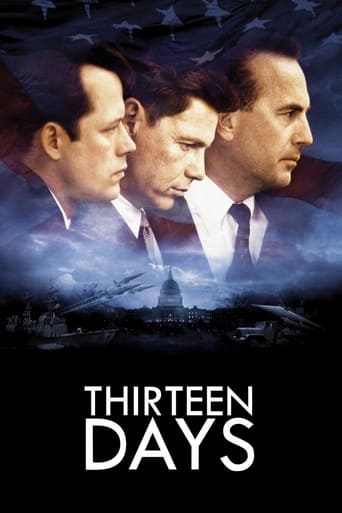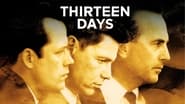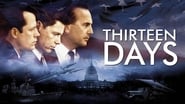dglink
In October 1962, the United States and the Soviet Union were on the verge of war over Soviet missile installations in Cuba. Based on President John F. Kennedy's tapes and a script by David Self, Roger Donaldson's outstanding film, "Thirteen Days," effectively recreates that tense Cold War period. Told from the perspective of JFK's White House, including the president; his brother Robert, the Attorney General; and the Special Assistant to the President, Kenny O'Donnell; the film is largely dialog driven. Evidently based on actual conversations, cabinet meetings, and confrontations between the administration and the military, the proceedings have the ring of truth. Kevin Costner, who also co-produced, heads the cast as O'Donnell; his effective low-key performance communicates the stress of his unique job situation and the toll it takes on his family and private life. In one particularly effective scene, Costner stands outside a church, where a line of parishioners are waiting for confession; a sign says that confession is available throughout the night, and, after a pause, Costner joins the line.Bruce Greenwood and Steven Culp play John and Robert Kennedy, respectively; both actors bear a passing resemblance to the Kennedy brothers, and, with Boston accents, they quickly submerge themselves into their parts, and the leads are well supported by a cast of pros, who portray a who's who of Kennedy administration officials familiar to any Baby Boomer who lived through the Camelot era; among them, Dylan Baker as Robert McNamara, Michael Fairman as Adlai Stevenson, and Len Cariou as Dean Acheson are worth mentioning.Although the film's ending is already part of history, "Thirteen Days" remains engrossing, often tense, suspenseful, and fast paced. An excellent score by Trevor Jones punctuates the action, and the footage shifts from color to black and white in a seemingly arbitrary manner; however, whatever the intention, the shifts neither add nor detract from the movie. Stock footage depicts civil defense preparations, and shots of nuclear explosions foretell what could occur if the negotiations between the U.S. and the Soviets had failed. Donaldson avoids claustrophobia by cutting from the White House to action in the skies over Cuba and events at sea as the U.S. blockade of Cuba takes effect. An excellent film that is well made and well performed, "Thirteen Days" is more than a history lesson; it is a warning as well. The film would make a good double bill with Costner's earlier Kennedy movie, "JFK."
SnoopyStyle
It's October, 1962, the Cuban missile crisis. Photos from the U-2 spy plane show possible nuclear missiles on Cuban soil. This sets off high level panic that almost ends with WWIII. The movie centers on the Special Assistant to the President, Kenny O'Donnell (Kevin Costner). The push from the military is for a full invasion of Cuba. However, the Kennedy brothers and Kenny push back.This is more like a brilliant stage play done with so much intensity that the audience is right there in the room. There are flashes of newsreels, CGI, and other footage to fill out the movie with the outside world. It is very much a political thriller inside the President's inner circle. It is tense despite the well known ending and event highlights. The use of Costner as a side character pushed out to be the lead is brilliant. It allows the best (but lesser known) actors in some of the most iconic roles around. Surprisingly, there are also flashes of humor. The acting is amazing. This is one of the best movies about those thirteen days.
bitesizemoviereview dotblogspotdotcom
Fast-paced and well-acted, Thirteen Days is an intriguing, suspenseful political drama. With a few glaring exceptions (such as Kenny O'Donnell's role in the Cuban missile crisis), this movie is historically accurate in its portrayal of the panic that struck the nation during the missile crisis, which turned out to be, arguably, John F. Kennedy's greatest political victory. What fascinated me about Thirteen Days was the top-notch portrayal of John F. Kennedy and Robert Kennedy. I was also impressed with the screenplay, especially the fast-paced, realistic dialogue (though much of the real-life language was cleaned up). Another success of the film were the beats of each scene that lent the film overall authenticity (O'Donnell's playful exchange with Jackie about the candy, for example). Although the lack of physical action may bore some viewers, Thirteen Days is a well-crafted, suspenseful dramatization of the Cuban Missile Crisis, and certainly worth a watch.http://bitesizemoviereview.blogspot.com/
ma-cortes
The 1962 Cuban Missile Crisis seen through the eyes of President assistant Kenny O'Donnell (Kevin Costner who hands perfectly the role )as trusted confidante and with significance importance of Robert Kennedy ( Steven Culp who bears remarkable resemblance )and of course President John F . Kennedy ( a solid Bruce Greenwood ) . This interesting film widely develops the Cuban Missile Crisis that was a confrontation between the Soviet Union, Cuba and the United States in October 1962, during the Cold War. The picture is packed with suspense , drama , historical deeds and is quite entertaining . It's correctly based on facts and the few sacrifices of accuracy are realized in the sense of of dramatic license . The motion picture is very well directed by Roger Donaldson who formerly worked with Costner in another suspenseful movie and also plenty of political intrigue titled ¨No way out (87) ¨ .Adding more details over the widely depicted on the movie the events happened of the following manner : In September 1962, the Cuban and Soviet governments began to surreptitiously build bases in Cuba for a number of medium- and intermediate-range ballistic nuclear missiles (MRBMs and IRBMs) with the ability to strike most of the continental United States. This action was subsequent to the 1958 deployment of Thor IRBMs in the UK and Jupiter IRBMs to Italy and Turkey in 1961; more than 100 U.S.-built missiles having the capability to strike Moscow with nuclear warheads. On October 14, 1962, a United States U-2 photo-reconnaissance plane captured photographic proof of Soviet missile bases under construction in Cuba.The ensuing crisis ranks with the Berlin Blockade as one of the major confrontations of the Cold War and is generally regarded as the moment in which the Cold War came closest to turning into a nuclear conflict .The US President ( Bruce Greenwood) , Attorney General Robert Kennedy (Steven Culp ),State Secretary Robert McNamara ( Dylan Baker ) and his military staff ( Bill Smitrovich , Ed Lauter , James Karen , Len Cariou) and general Curtis LeMay (Kevin Conway ) considered attacking Cuba via air and sea and settled on a "quarantine" of Cuba. The U.S. announced that it would not permit offensive weapons to be delivered to Cuba and demanded that the Soviets dismantle the missile bases already under construction or completed in Cuba and remove all offensive weapons. The Kennedy administration held a slim hope that the Kremlin would agree to their demands, and expected a military confrontation. On the Soviet end, Nikita Khrushchev wrote Kennedy that his quarantine of "navigation in international waters and air space to constitute an act of aggression propelling humankind into the abyss of a world nuclear-missile war." Fidel Castro encouraged Khrushchev to launch a preemptive first-strike nuclear attack on the U.S. The Soviets publicly balked at the U.S. demands, but in secret back-channel communications initiated a proposal to resolve the crisis. The confrontation ended on October 28, 1962 when President John F. Kennedy and United Nations Secretary-General U Thant reached an agreement with Soviet Premier Nikita Khrushchev to dismantle the offensive weapons and return them to the Soviet Union, subject to United Nations verification, in exchange for an agreement by the United States to never invade Cuba. The Soviets removed the missile systems and their support equipment, loading them onto eight Soviet ships from November 5–9. A month later, on December 5 and 6, the Soviet IL-28 bombers were loaded onto three Soviet ships and shipped back to Russia. The quarantine was formally ended previously on November 20, 1962. As a secret part of the agreement, all US-built Thor and Jupiter IRBMs deployed in Europe were deactivated by September 1963.The Cuban Missile Crisis spurred the creation of the Hotline Agreement and the Moscow-Washington hot line, a direct communications link between Moscow and Washington .






